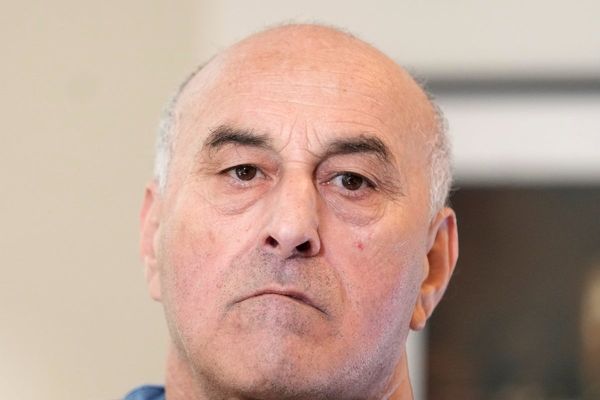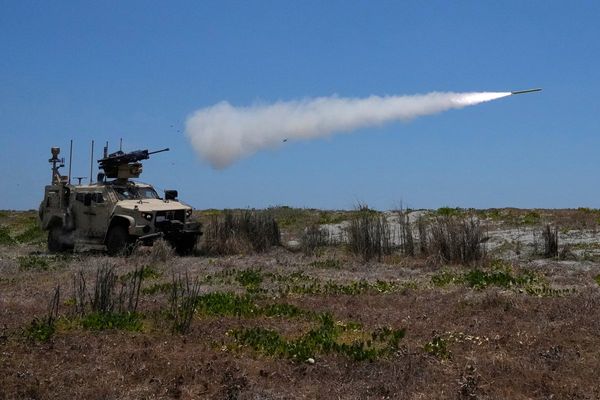
Discussing the weather has long been a harmless British pastime, with forecasters relied on to ruin bank holidays with their predictions of drizzle or give good news of some gentle summer sunshine.
But now TV meteorologists have found themselves on the frontline of the climate culture war after extreme temperatures hit England last month, with records smashed and highs of 40.3C (104.5F).
Laura Tobin is well known as the chirpy weather forecaster for Good Morning Britain. She is popular with viewers and has 200,000 Twitter followers. But she has found herself spending her time battling climate deniers as her job has tipped from giving updates on the mild British weather to charting the terrifying advance of the climate crisis.
She said: “When I’d just done my 6.15am weather forecast on the Tuesday morning, I said we are forecasting 41C and I sat and looked at my map after, I was talking to the guy who does my weather graphics for me, I actually teared up. I said, ‘I’ve forecasted it, it’s going to happen, it’s actually reality and it’s going to happen’. We could not believe it in the forecasting community. I was very emotional about it.”
But not all of her viewers took the hot temperatures so seriously, accusing her of “scaremongering” and complaining on social media when Tobin linked the heatwave to climate breakdown.
Some tweets accused her of sharing “weather propaganda” and said they switched off when seeing her on television. Some called for her to be jailed over her climate warnings and others called her “Dr Doom”.
“People say you should just tell us about the weather, you shouldn’t talk about climate change,” she said, adding: “People think that it’s someone else’s problem and they don’t want to hear it. People don’t like being told what to do.”
'Exceptional and unprecedented.'@Lauratobin1 explains how extreme the current weather is.#Heatwave2022 pic.twitter.com/zWFgi7k7rd
— Good Morning Britain (@GMB) July 18, 2022
Unlike many who face abuse and complaints on Twitter, Tobin makes a point of replying to climate deniers and even replies to their tweets live on air, answering their questions.
“Meteorologists are one of the main ways climate change is communicated to the public,” she said.
“We have a duty to tell the science and show why it matters. What we know, what we’ve seen [in such a short timescale], what we are saying isn’t being alarmist – what we are seeing is alarming. It’s not scaremongering – the truth scares people but the reality is scary.”
She views it as part of the job to convince people that the climate crisis is real. “I realised a long time ago that even if those people are one in a million or one in a thousand you have to talk to them and convince them they are wrong, showing them the proof. And I have managed to do it before, I have spoken to complete climate deniers and sceptics, shown them the science in a non-condescending way, and convinced them.”
And the angry comments do not upset her, as she believes it is her calling to warn people about the climate emergency.
“Anything that somebody can say that might be having a go at me or negative, my feelings about climate change blow that out of the water, I don’t get upset, I just want them to care and understand,” Tobin explained.
“For me the more emotional thing was that these temperatures were forecast and they became a reality, that the wildfires started, and that there will be hundreds if not thousands of fatalities. Because we gave massive warnings, places like care homes and schools could prepare and more people were saved.
“We had comments saying the Met Office should stick to forecasting not telling people what to do. Actually, I said, hold on a minute, all of these things will have helped save lives so why is it a bad thing? We suggest people bring an umbrella if it is going to rain, no one has a go at us for that, so why can we not suggest that people prepare for extreme weather?”
The meteorologist Scott Duncan shows the rapid change in climate by making and sharing stark graphics on social media. Many of these were shared thousands of times during the heatwave but also attracted abuse.
“These [extreme weather] events you get, you get the masses coming out with the pitchforks and torches. People think they can forecast the weather themselves, which is fine, but when people come to social media and bash the weather forecaster it’s just not on,” he said.
Celebrities and the media have also started unhelpful pile-ons for forecasters trying to warn about extreme heat.
“When Jeremy Clarkson was tweeting incorrectly about how France hadn’t declared a heatwave it was sort of stoking a mob, it’s not helpful. It makes people not take it as seriously as they should,” Duncan added.
After all of the attention Duncan’s tweets received, he he has begun posting less because of the emotional toll of reading the comments.
“I’ve seen horrible arguments breaking out among the comments and I’ve had to restrict comments because things go down a very dark path. You start to become numb to it, you used to be surprised to see these things and now you don’t.
“I’ve been posting less actually, I wanted a step back after the reaction.”
But Duncan and Tobin plan to continue telling the world about the climate emergency.
“The air we were breathing was hotter than our lungs on Monday and Tuesday [18-19 July] which wasn’t really a thing in the past – seeing 40C in places like Doncaster where had never been above the mid 30s – the scale of these record breaks definitely warranted the highest level of heat warning. If you don’t have a red warning for that then when would you use it?” said Duncan.
Tobin added: “It’s my job to give people a bit more science, a bit more understanding. I will keep doing it.”







